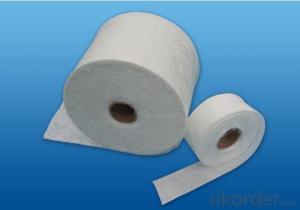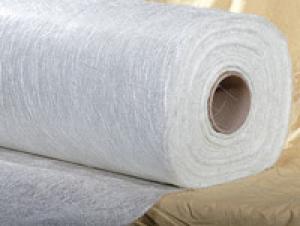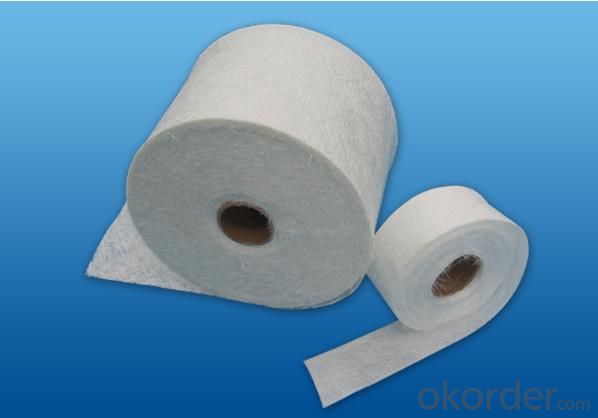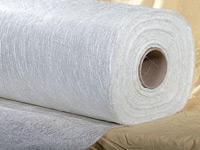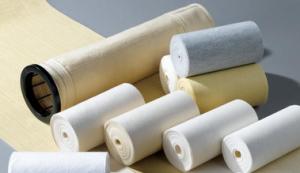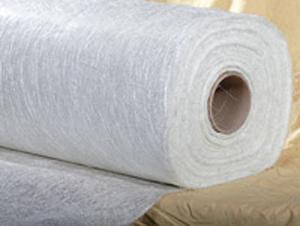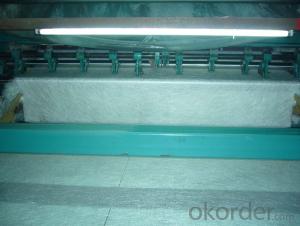Fiberglass Mat Tissue 450g Stitched Mat
OKorder Service Pledge
OKorder Financial Service
You Might Also Like
Structure of FIBERGLASS STITCHED MAT Description
The stitched mat is made of chopped strand which randomly dispersed and be stitched together by polyester thread. The width is available from 150-2400mm.Density of mat generally is 300-600g/m2.
The product is compatible with Polyester resin, vinyl ester resin, and epoxy resin.
Stitched mat is mostly primarily in pultrusion, RTM, filament winding, compression molding and hand lay up processes.
It is widely used in pipe lining, pultrusion section, storage tanks, FRP boat, insulation panel etc.
Main Features of FIBERGLASS STITCHED MAT
◎ Uniform thickness, good wet tensile strength retention.
◎ Good mould-ability, good drapability and easy operation.
◎ Good wet out speed and high efficiency in production.
FIBERGLASS STITCHED MAT Images
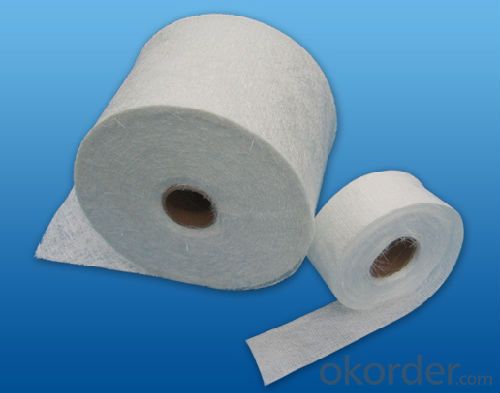
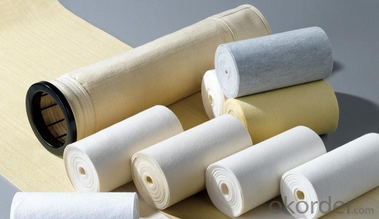
FIBERGLASS STITCHED MAT Specification:
Code | Density(g/m2) | Chopping layer density g/m2 | Width mm |
EMK225 | 225 | 225 | 150~2600 |
EMK250 | 250 | 250 | 150~2600 |
EMK300 | 300 | 300 | 150~2600 |
EMK450 | 450 | 450 | 150~2600 |
EMK600 | 600 | 600 | 150~2600 |
FAQ of FIBERGLASS STITCHED MAT
1. Why Choose us?
CNBM is a stated own company, provide the guarantee for the best quality, best service and safety business.
2. How will we guarantee the quality?
a, ISO 9001-2008 quality control system;
b, Strict and regular quality control in production;
c, Inspeciation when loading into container before shippment;
d, Sample stock for one year for quality tracing and record.
3. What is your MOQ?
Our MOQ is one pallet.
4. Can you provide sample?
Yes, samples are in stock. we can offer free sample for you.
5. Payment terms?
We can accept L/C, T/T etc.
6. Do you offer OEM service?
Yes, we can print customers’ logo on the packaging;
And the size and specification can be produced and design according to your demand.
- Q: Can fiberglass mat tissue be used for reinforcing fiberglass roofs?
- Indeed, fiberglass mat tissue is a suitable option for reinforcing fiberglass roofs. Comprised of delicate fibers that are joined together using a binder, fiberglass mat tissue is a thin and lightweight material. It is widely utilized as a reinforcement layer in fiberglass composites, providing them with robustness and endurance. Concerning fiberglass roofs, fiberglass mat tissue can be applied as an extra layer to enhance the roof's structural integrity. This additional layer aids in evenly distributing the load across the surface, thereby augmenting the roof's resistance against cracks, leaks, and other types of damage. Typically, fiberglass mat tissue is used alongside other fiberglass products, including resin and fiberglass cloth, to generate a sturdy composite material. The mat tissue is placed atop the fiberglass cloth prior to the application of resin. Subsequently, the resin saturates the mat tissue, establishing a bond between the layers. This combination results in a reinforced fiberglass roof that possesses heightened strength and durability. Moreover, fiberglass mat tissue can confer thermal insulation properties to the roof, contributing to temperature regulation and reduced energy consumption. It exhibits resistance against heat transfer, thereby preventing excessive heat accumulation within the building during hot weather. All in all, fiberglass mat tissue is an exceptional choice for reinforcing fiberglass roofs. By adding strength, durability, and thermal insulation properties to the roof, it becomes a reliable option for both residential and commercial buildings.
- Q: Is fiberglass mat tissue suitable for underground applications?
- Fiberglass mat tissue is indeed suitable for underground applications. This material is commonly used in various industries, including construction, infrastructure, and plumbing, due to its exceptional strength, durability, and resistance to environmental factors. Underground environments often pose challenges such as moisture, high humidity, and corrosive substances, which can compromise the integrity of traditional materials. However, fiberglass mat tissue is specifically designed to withstand these conditions, making it an ideal choice for underground applications. Additionally, its non-combustible nature and resistance to chemicals make it a reliable option for areas where fire safety is a concern. Overall, fiberglass mat tissue is a versatile and reliable material that can effectively withstand the challenges of underground environments.
- Q: Is fiberglass mat tissue suitable for insulation in wastewater treatment plants?
- Yes, fiberglass mat tissue is suitable for insulation in wastewater treatment plants. Wastewater treatment plants often require insulation to prevent heat loss, control temperature, and protect against corrosion. Fiberglass mat tissue is a commonly used material for insulation in these facilities due to its high thermal resistance, excellent chemical resistance, and durability. It can effectively insulate pipes, tanks, and other equipment in wastewater treatment plants, ensuring optimal performance and energy efficiency. Additionally, fiberglass mat tissue is lightweight, easy to install, and cost-effective, making it a practical choice for insulation in these harsh environments.
- Q: What are the different reinforcement orientations available for fiberglass mat tissue?
- There are several different reinforcement orientations available for fiberglass mat tissue, each serving a specific purpose in various applications. One common orientation is the unidirectional reinforcement, where the fibers are aligned in one direction. This orientation provides high strength and stiffness in the direction of alignment, making it suitable for applications that require resistance to tension or bending forces in a single direction. Another orientation is the bidirectional reinforcement, where the fibers are aligned in two perpendicular directions. This orientation provides equal strength and stiffness in both directions, making it ideal for applications that require resistance to both tension and compression forces. Bidirectional reinforcement is commonly used in structural components such as panels, pipes, and tanks. A third orientation is the randomly oriented reinforcement, where the fibers are distributed in a random manner. This orientation offers isotropic properties, meaning it provides similar strength and stiffness in all directions. Random reinforcement is often used in applications that require uniform strength and flexibility, such as automotive parts, boat hulls, and sporting goods. Additionally, there are also hybrid reinforcement orientations available, which combine different types of fibers or orientations to achieve specific performance requirements. These hybrid reinforcements can offer a combination of strength, stiffness, flexibility, and other desired properties, making them suitable for a wide range of applications. Overall, the choice of reinforcement orientation for fiberglass mat tissue depends on the specific requirements of the application, including the desired mechanical properties, the direction of forces to be resisted, and other performance considerations.
- Q: Can fiberglass mat tissue be used for aerospace applications?
- Yes, fiberglass mat tissue can be used for aerospace applications. Fiberglass mat tissue is a lightweight and strong material that is commonly used in the aerospace industry for various purposes. It is often used as a reinforcement material in composite structures, such as aircraft wings, fuselages, and other components. The high strength-to-weight ratio of fiberglass mat tissue makes it an ideal choice for aerospace applications, as it helps to reduce the overall weight of the aircraft while maintaining structural integrity. Additionally, fiberglass mat tissue is resistant to corrosion and can withstand extreme temperatures, which are important factors in aerospace environments. Overall, fiberglass mat tissue is a versatile material that meets the stringent requirements of aerospace applications and is widely used in the industry.
- Q: What is the moisture vapor transmission rate of fiberglass mat tissue?
- The moisture vapor transmission rate of fiberglass mat tissue is subject to variation based on factors like the material's specific composition and thickness. As a general rule, fiberglass mat tissue tends to exhibit a relatively low moisture vapor transmission rate. Its ability to facilitate the passage of moisture vapor is comparatively limited. Consequently, this attribute renders it suitable for applications where moisture resistance is sought, such as in insulation or construction materials. However, it is crucial to acknowledge that the moisture vapor transmission rate of fiberglass mat tissue can be additionally impacted by other variables, including the existence of coatings or laminations. These additional elements have the potential to enhance or restrict its moisture vapor transmission properties.
- Q: Does fiberglass mat tissue require any special precautions during handling?
- Yes, fiberglass mat tissue does require some special precautions during handling. Fiberglass mat tissue is made up of tiny glass fibers that can cause irritation to the skin, eyes, and respiratory system if not handled properly. It is important to wear protective clothing, such as gloves, long sleeves, and goggles, to minimize direct contact with the skin and eyes. Additionally, it is advisable to work in a well-ventilated area or wear a respirator to prevent inhaling the airborne fiberglass particles. It is also recommended to handle fiberglass mat tissue gently to avoid breaking the fibers and creating more airborne particles. Overall, taking these precautions will help minimize the potential health risks associated with handling fiberglass mat tissue.
- Q: How does fiberglass mat tissue perform in terms of thermal expansion?
- With a relatively low thermal expansion coefficient, fiberglass mat tissue expands very little when subjected to heat. This quality makes it a superb choice for situations where maintaining thermal stability is of utmost importance. The tightly woven structure of fiberglass mat tissue effectively controls the material's expansion and contraction, even under extreme temperatures. As a result, it demonstrates outstanding dimensional stability and the ability to withstand thermal stresses. This characteristic enables fiberglass mat tissue to retain its structural integrity when exposed to drastic temperature changes, which is why it is widely recognized as an ideal material in industries like aerospace, automotive, and construction, where dealing with thermal expansion and contraction can be particularly challenging.
- Q: Is fiberglass mat tissue suitable for sound absorption?
- Fiberglass mat tissue is indeed appropriate for sound absorption. Its exceptional acoustic properties make it a highly efficient material for decreasing noise levels and enhancing sound quality in different settings. The fibrous composition of the mat tissue offers a large surface area capable of absorbing sound waves and converting them into heat energy. This renders it an optimal choice for soundproofing walls, ceilings, and floors in buildings, as well as for automotive, industrial, and marine applications. Moreover, fiberglass mat tissue is lightweight, simple to install, and possesses excellent durability and fire resistance, further augmenting its aptness for sound absorption objectives.
- Q: Is fiberglass mat tissue resistant to corrosion?
- Yes, fiberglass mat tissue is resistant to corrosion. Fiberglass is made of non-metallic substances, such as glass fibers, that do not rust or corrode like metals do. This makes fiberglass mat tissue an ideal material for applications where corrosion resistance is required, such as in the construction industry for reinforcing concrete structures or in the marine industry for boat building. Additionally, fiberglass mat tissue is also resistant to chemicals, moisture, UV rays, and extreme temperatures, further enhancing its durability and longevity.
Send your message to us
Fiberglass Mat Tissue 450g Stitched Mat
OKorder Service Pledge
OKorder Financial Service
Similar products
Hot products
Hot Searches
Related keywords
